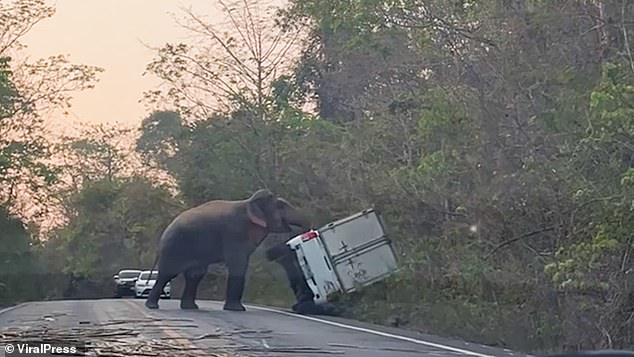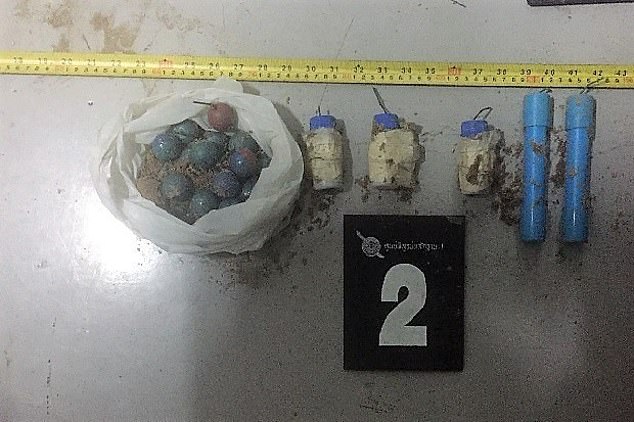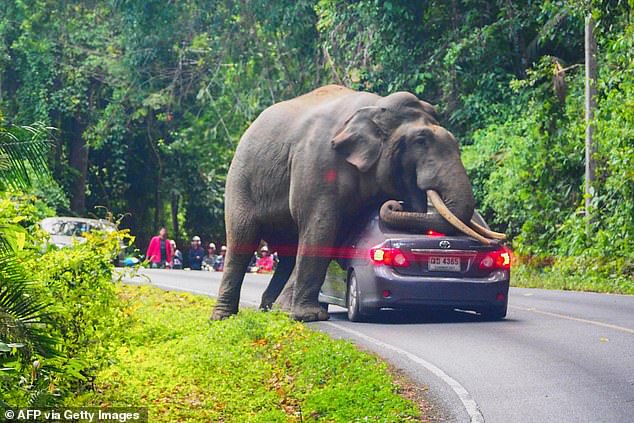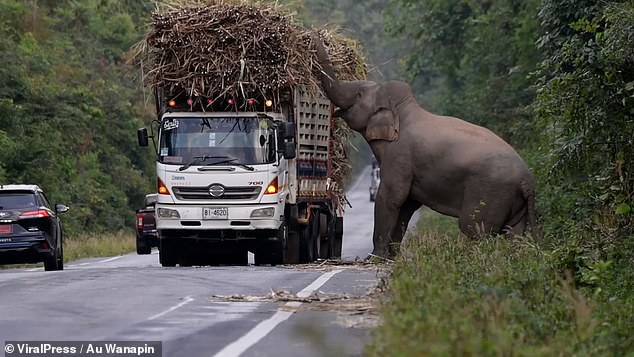‘They play with bodies like a doll’: How rampaging elephants are terrorising Thailand with a surge in fatal attacks as locals arm themselves with ‘ping pong’ bombs to scare off growing number of animals
Runaway elephants are terrorizing people in Thailand with a wave of deadly attacks as locals began arming themselves with ‘ping-pong bombs’ to deter the animals.
Elephant numbers in Thailand are increasing due to repopulation efforts, but as their natural habitat shrinks at the same time, they have been forced to move closer to villagers, causing more than 90 fatal encounters in the east of the country since 2018.
Now local farmers are using homemade ‘ping-pong bombs’, bought at roadside markets, to defend their crops – and themselves – from the marauding animals, hoping to scare the mammals away with the mini explosives.
Unfortunately, the ping-pong bombs seemed to have the opposite effect and made encounters with elephants even more dangerous for villagers.
‘They grab you, they hit you against a tree, sometimes they kill you by stepping on you or using their tusks. They can play with bodies as if they were dolls,” said Taan Wannagul, a researcher at the Eastern Elephants Education Centre. Telegraph.
Runaway elephants are terrorizing people in Thailand with a wave of deadly attacks, as locals began arming themselves with ‘ping pong bombs’ to deter the growing numbers of animals (file image of an elephant in Thailand’s Khao Yai National Park )

Now local farmers are using homemade ‘ping pong bombs’ (pictured), bought at roadside markets, to defend their crops – and themselves – from the marauding animals, hoping to scare the mammals away with the mini explosives.

An aggressive wild elephant rammed and overturned a pickup truck in March 2023 about 80 miles east of the capital Bangkok in Thailand’s rural Chachoengsao province.
“Of course elephants won’t attack, but people throw the ‘ping pong bombs’ and make loud noises to scare the elephants away,” he added. ‘Now the elephants have become more aggressive.’
A 73-year-old farmer named Pae Pakdee was killed by an elephant in a savage attack in which a 10-foot bull elephant nicknamed ‘Yellow’ ripped its limbs from its body.
He was found by his wife, Boonsri Pakdee, 69, who said her “heart broke” that day when gruesome photos revealed the “mangled mess” her beloved husband left behind.
Boonsri has lost confidence that villagers could live peacefully alongside elephants, calling this ‘impossible’.
Elephants are considered sacred in Thailand and many believe that the Thai government has placed the animal’s life above that of humans because the fine (and possible prison sentence) for killing an elephant is much higher than the compensation given to the families of those killed by the mammal.
A farmer in the Chachoengsao region, 130 kilometers east of the capital Bangkok, said that when she and other villagers see an elephant, they hide.
Locals have resorted to using ping-pong bombs – small, colorful plastic balls with a fuse attached – to deter them.
Despite their small size, the homemade explosives are powerful enough to blow off a finger if held for too long.
One of the initiatives to combat the increasing problem of elephants decimating crops and even attacking local people, sees local rangers patrolling the game parks now also tracking elephants.

Ping pong bombs seized by local police in Thailand

A wild elephant stops a car on a road in Khao Yai National Park in Thailand’s Nakhon Ratchasima province on October 29, 2019

A greedy wild elephant avoided jungle leaves and instead stopped by passing trucks to steal sugar cane. The 35-year-old jumbo, dubbed ‘Fatty’ by locals, emerged from the forest on a road in Chachoengsao province, Thailand on December 29, 2022.
They begin their shifts by purchasing ping-pong bombs from roadside stalls, before tracking elephants and hoping to push them back into the nearby Chachoengsao nature reserve by detonating the explosives or firing warning shots from guns.
Although they have had limited success, these groups are simply not large enough and do not have the necessary resources to cover the vast area.
A park ranger said that although he and his colleagues did their best to track down the elephants, there have been instances when villagers took matters into their own hands.
Meanwhile, Mr Wannagul of the research center has set up dozens of motion sensor cameras that will provide live information on the movements of the elephants in the area after attempts to contain the mammals within the national park with metal fences failed.
The data will be used in a local “war room” due to open in October, set up by Mr Wannagul in collaboration with the Thai government.
The researcher said population control may be necessary as the number of elephants is growing rapidly at eight percent per year.
He added that another important measure is to ensure that the elephant’s habitat does not shrink further.
The number of Asian elephants in the wild now stands at about 4,000 after the government began protecting Thailand’s remaining forests and nature reserves and enforcing anti-poaching laws.
Conservationists praised the measures taken to protect the elephants after the population plummeted from around 100,000 to fewer than 3,000 within a hundred years.
But they admitted that in the eastern provinces, where elephants are moving closer to villages, this is “causing major problems” as the animals run out of food and space in shrinking forest areas and small national parks.
The mammals eat about 200 kg of food per day. While they have to walk to find this food if they stay in the forest, in human areas it is readily available and ‘like a big buffet’ to them.
This is causing huge problems for farmers, such as those north of the Khao Ang Rue Nai Wildlife Reserve, who say they have lost most of their crops to marauding elephants – some even their annual income.
Because government compensation is limited, many are pushed to take out loans to recover.
